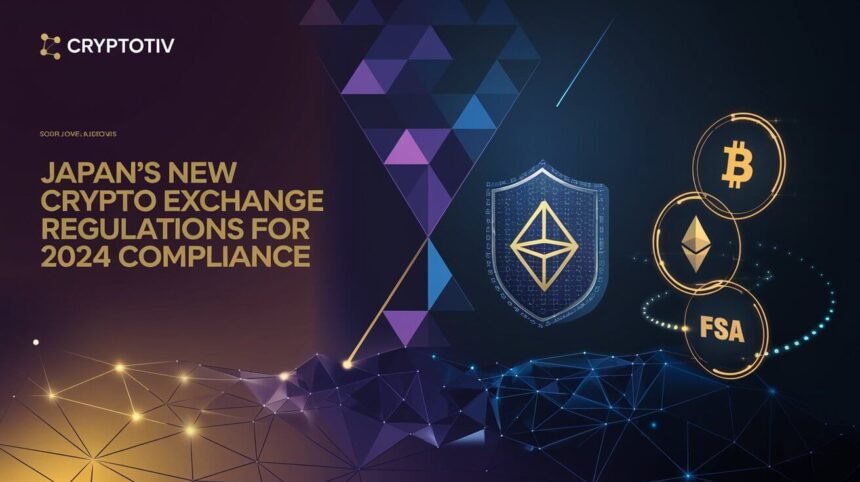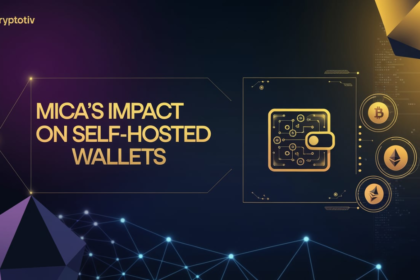Japan’s new crypto exchange regulations for 2024 compliance aim to significantly tighten operational security and enhance anti-money laundering (AML) measures. These regulations, issued by Japan’s Financial Services Agency (FSA), address the vulnerabilities in crypto exchanges, particularly in light of high-profile hacks like Coincheck in 2018.
With stricter compliance requirements, crypto platforms in Japan must ensure more robust customer protection and enhanced oversight. These new rules mitigate financial crimes and reinforce market transparency, particularly through enhanced AML procedures.
Japan’s Updated Crypto Regulatory Framework
Japan’s Financial Services Agency (FSA) has implemented a comprehensive regulatory framework for cryptocurrency exchanges in 2024. This new framework emphasizes stricter compliance requirements and heightened oversight to protect investors and enhance the transparency of operations. In response to security incidents like the 2018 Coincheck hack, these regulations represent Japan’s dedication to mitigating financial crime and establishing a safer environment for crypto users.
The FSA’s approach is particularly focused on strengthening asset security and enforcing more robust anti-money laundering (AML) measures, which are now a critical component of the legal landscape governing cryptocurrency exchanges in Japan.
Stricter Asset Segregation and Storage Requirements
Japan’s crypto exchange regulations demand strict segregation of customer assets, ensuring that user funds are protected against potential misuse. As of 2024, exchanges must hold at least 95% of customer funds in cold wallets, a security measure that helps mitigate the risks of hacks and asset mismanagement. This regulation aims to prevent incidents like the Coincheck hack, where improper asset management led to substantial losses for users. By requiring cold wallet storage, the FSA significantly reduces the risk of asset theft from exchanges.
In addition to cold storage, exchanges must keep separate accounts for customer funds and their operational funds. This segregation ensures that customer assets remain untouched even in the event of the exchange facing financial issues. These strict storage and segregation rules are core to Japan’s mission to bolster user protection under its crypto regulatory framework.
Mandatory Audits and Operational Oversight
To enhance transparency and operational accountability, all licensed crypto exchanges in Japan must now undergo annual financial audits. These audits are designed to ensure that exchanges comply with the asset segregation requirements and accurately report their financial status. Failure to comply with these audit standards can result in severe penalties, including license suspension or revocation.
The audit process involves a thorough review of how exchanges handle customer funds, particularly ensuring adherence to cold wallet storage and segregation of assets. Additionally, exchanges are now required to have internal protocols in place to maintain financial integrity and report discrepancies directly to the FSA.
Checklist for Compliance:
- Ensure 95% of customer funds are stored in cold wallets.
- Conduct annual audits to verify asset segregation and financial health.
- Implement stringent internal controls for reporting financial irregularities.
Enhanced AML and KYC Measures
Japan has taken a proactive stance on anti-money laundering (AML) by reinforcing its Know Your Customer (KYC) procedures. Under the new regulations, crypto exchanges must conduct thorough KYC checks for every user to comply with global AML standards. This includes verifying user identity before they can engage in transactions.
Additionally, Japan’s crypto exchanges are now required to comply with the “Travel Rule”, which mandates sharing customer information for transactions above a certain threshold. This rule enhances cross-border transaction monitoring and aims to prevent money laundering and other financial crimes. Non-compliance with AML measures can lead to substantial fines and legal actions.
Related articles:
Impact of New AML Regulations on Crypto Operations
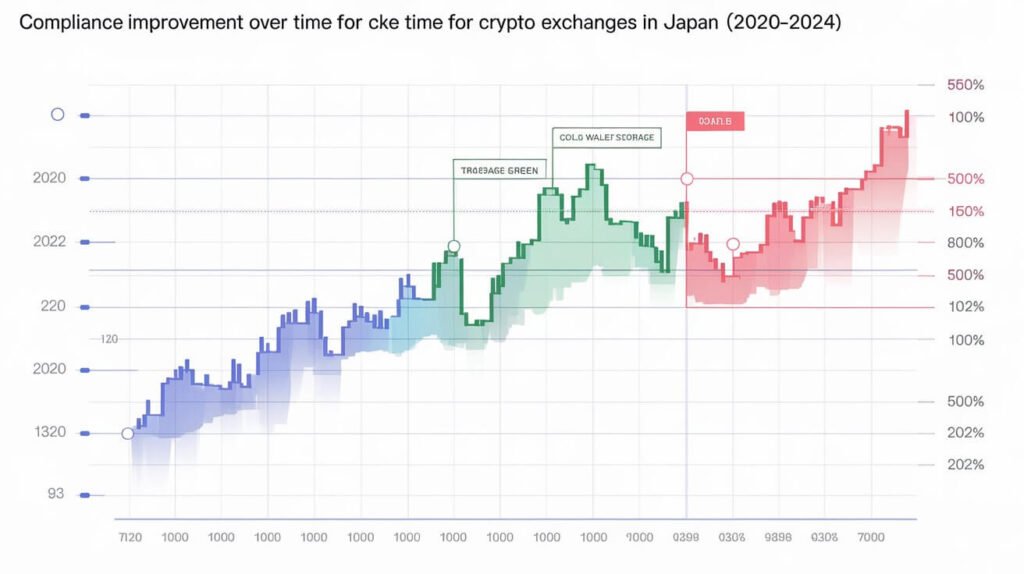
Japan’s updated anti-money laundering (AML) regulations have made a significant impact on the operational dynamics of cryptocurrency exchanges. By focusing on preventing money laundering and enhancing financial integrity, these new rules establish stricter cross-border transaction monitoring and reinforced Know Your Customer (KYC) protocols. As Japan tightens its regulatory grip, crypto exchanges must align with these changes to maintain their licenses and avoid potential penalties.
Travel Rule Enforcement and Cross-Border Compliance
The Travel Rule, a global standard introduced by the Financial Action Task Force (FATF), requires that all cryptocurrency exchanges share customer information for cross-border transactions that exceed a specified value. Japan’s Financial Services Agency (FSA) has adopted the Travel Rule as a key measure in its AML strategy for 2024.
Under this rule, crypto exchanges must exchange the details of both the sender and the recipient for any transaction above a certain threshold, ensuring greater transparency and accountability across borders. This is crucial for detecting and preventing illicit activities such as money laundering, which has been a growing concern in the crypto industry globally. Failure to comply with the Travel Rule could result in steep fines, loss of operating licenses, or even legal action.
These new requirements have added complexity to the operations of crypto exchanges, particularly for international platforms dealing with large transaction volumes. As a result, exchanges are now investing in advanced compliance systems capable of securely storing and transmitting sensitive customer information.
Customer Due Diligence in the Japanese Crypto Market
One of the most significant updates to Japan’s regulatory framework is the enhancement of customer due diligence (CDD) requirements. As part of the updated AML rules, crypto exchanges must perform more rigorous identity verification and monitoring of user activity. These enhanced CDD protocols involve verifying customer identities, understanding the nature of customer transactions, and ensuring that customer funds are not associated with criminal activity.
Comparative Table: Pre-2024 vs. 2024 Due Diligence Requirements
| Criteria | Pre-2024 Requirements | 2024 Requirements |
|---|---|---|
| KYC Verification | Basic identification checks | Full identity verification with enhanced KYC protocols |
| Cross-Border Transaction Monitoring | Minimal cross-border oversight | Full compliance with the Travel Rule and reporting obligations |
| Transaction Reporting | Transaction monitoring based on internal policies | Mandatory reporting for suspicious activities and large transfers |
| Compliance Deadlines | No strict enforcement timelines | Strict deadlines for compliance, failure to meet leads to penalties |
These stricter requirements align with global AML standards and make it difficult for bad actors to operate within Japan’s crypto space. The comprehensive KYC procedures now demand that exchanges collect detailed information on their users and continuously monitor for suspicious activity. This shift makes customer due diligence an integral part of crypto exchange operations.
Regulatory Penalties and Compliance Challenges for Crypto Exchanges
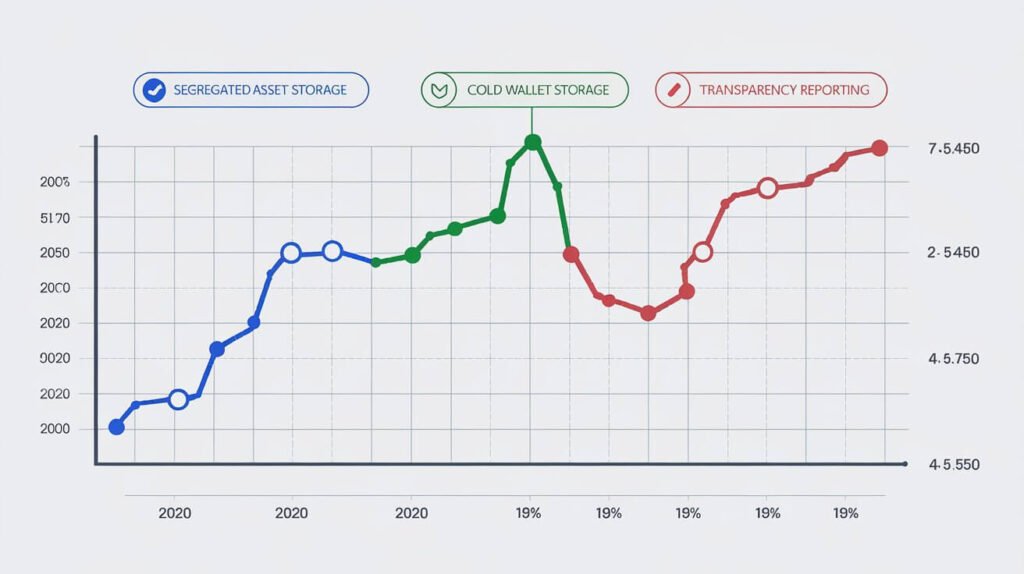
The 2024 regulatory framework introduced by Japan’s Financial Services Agency (FSA) brings a more rigorous set of standards for cryptocurrency exchanges. To enforce these rules effectively, the FSA has implemented significant penalties for non-compliance, ranging from financial fines to the suspension or revocation of operating licenses. These penalties, coupled with the stringent compliance demands, present operational challenges for exchanges, particularly smaller platforms and international entities attempting to navigate Japan’s complex regulatory environment.
Non-Compliance Penalties and FSA Enforcement
Crypto exchanges operating in Japan are subject to heavy fines and even suspension if they fail to meet the new regulatory standards. The FSA has made it clear that failure to comply with asset segregation rules, security protocols, or anti-money laundering (AML) measures will not be tolerated. Non-compliance can lead to:
- Fines: Financial penalties can be substantial, depending on the severity of the violation. Exchanges that do not meet the required asset storage and AML measures face hefty fines.
- License Suspension: Exchanges may face temporary or permanent license suspensions if their operations are deemed unsafe for consumers. This is particularly the case for those who fail multiple audits or repeatedly violate the FSA’s standards.
- Operational Bans: In extreme cases, where an exchange poses significant risks to the market or its users, the FSA reserves the right to issue an operational ban, shutting down the exchange altogether.
Note
Enforcement measures underline the importance of compliance in a market where security incidents like the Coincheck hack have had far-reaching consequences. The FSA aims to foster a safer and more transparent cryptocurrency environment in Japan by enforcing such strict penalties.
Operational Challenges for Small and International Exchanges
While large, well-established exchanges may find it easier to comply with Japan’s updated regulatory framework, smaller exchanges and international platforms face more significant hurdles. These challenges include:
- Financial Burden: Smaller exchanges often lack the financial resources to implement the robust security and compliance measures required by the FSA. The cost of cold wallet infrastructure, annual audits, and customer due diligence (CDD) processes can be prohibitively high.
- Complex Compliance Requirements: For international exchanges, navigating Japan’s complex regulatory landscape can be challenging, especially when balancing compliance with both home country regulations and Japan’s more stringent standards. Platforms like Binance Japan K.K. have had to establish separate legal entities to meet local requirements.
- Staffing and Expertise: Compliance with Japan’s regulations often requires hiring specialized personnel who are familiar with the intricacies of the country’s crypto laws, placing additional strain on smaller exchanges that may not have the resources for such hires.
Note
Factors make it difficult for smaller and international platforms to operate within Japan’s borders, often leading to consolidation within the market, where only the most well-resourced exchanges can thrive.
Japan’s Focus on Investor Protection and Financial Transparency
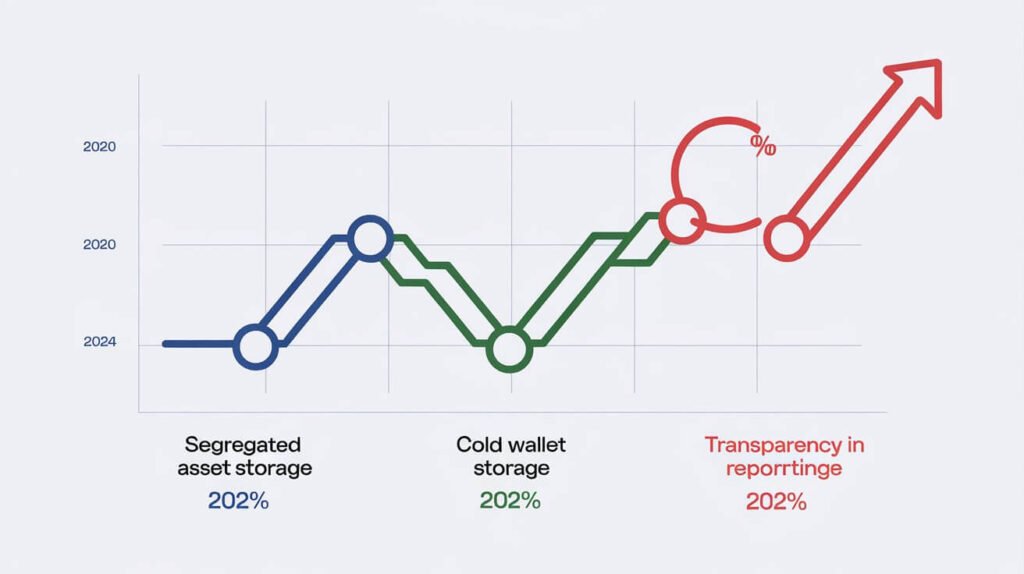
Japan’s regulatory updates for 2024 emphasize the protection of investors and the enhancement of financial transparency in the cryptocurrency market. These regulations were introduced in response to past issues like exchange hacks and financial mismanagement, underscoring Japan’s commitment to safeguarding crypto users and maintaining a trustworthy trading environment. By enforcing stricter rules on asset storage, reporting, and operational transparency, Japan aims to reduce fraudulent activities and increase investor confidence in the market.
Measures for Securing Customer Assets
One of the key components of Japan’s regulatory framework is the updated rules regarding customer asset protection. Cryptocurrency exchanges are now required to:
- Segregate Customer Assets: Exchanges must ensure that customer assets are held separately from the company’s operational funds. This prevents the misuse of user assets for business operations or other financial activities, offering greater security for investors.
- Cold Wallet Storage Compliance: At least 95% of customer funds must be stored in cold wallets, which are not connected to the internet. Cold storage significantly reduces the risk of hacking and unauthorized access, a vital lesson learned from past incidents such as the Coincheck hack.
- Transparency in Financial Reporting: Exchanges must now maintain full transparency in their financial statements, regularly reporting to the FSA. This includes providing detailed accounts of how customer assets are stored and managed.
Checklist for Compliance:
- Customer asset segregation.
- Cold wallet storage for at least 95% of user funds.
- Regular, transparent financial reporting to the FSA.
Note
By implementing these measures, Japan is reinforcing investor protection, ensuring that funds are safeguarded and managed responsibly, which is crucial for market stability.
Fostering Market Confidence through Financial Integrity
To foster market confidence, the FSA’s regulatory framework focuses on improving financial integrity across crypto exchanges. Transparency in operations builds trust and reduces the risk of fraudulent activities such as fund mismanagement or unreported hacks. Exchanges are now required to undergo annual audits, which ensure that their operations meet the strict security and compliance standards set by the FSA. These audits help detect and prevent any discrepancies, thus protecting investors from potential financial losses.
Regulatory approach is designed to create a more secure environment for cryptocurrency trading in Japan, where investors can be confident that their assets are being managed with the highest levels of integrity. The overall goal is to prevent a recurrence of major security breaches, thereby stabilizing the market and attracting more participants to Japan’s crypto ecosystem.
The 2024 regulatory updates introduced by Japan’s Financial Services Agency (FSA) mark a significant step in ensuring the security and transparency of cryptocurrency exchanges operating within the country. By enforcing stricter compliance measures, including asset segregation, enhanced anti-money laundering protocols, and mandatory audits, Japan is setting a high standard for operational integrity within the crypto market. These regulations reflect the growing need to safeguard investor assets, foster market confidence, and mitigate risks related to financial crimes such as money laundering and fraud.
With these new rules, crypto exchanges face both opportunities and challenges. While the requirements for compliance may pose difficulties, particularly for smaller and international platforms, these measures ultimately create a safer and more transparent environment for investors. As Japan continues to lead in the regulation of cryptocurrency, its approach may serve as a model for other nations aiming to balance innovation with security in the rapidly evolving digital asset space.



